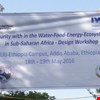


Following the end of the first phase of WACDEP in 2016, an African Ministers’ Council on Water (AMCOW) programme implemented by the Global Water Partnership (GWP) and partners, a number of knowledge products have been developed to help capture the various lessons and experiences drawn from the various WACDEP projects. The products provide a more comprehensive understanding of the programmes innovative approach.
These knowledge products are the opportunity to make available the programmes thinking and knowledge as we continue to build a water secure and climate resilient world. Access the products below:

The Youth H2O forum joined a number of stakeholders in commemorating World Water Day which fell on 22nd March 2016. The day was commemorated in two different places. The main event was held in Choma Southern province on the 21st March, and the other event was held in Lusaka at Mtendere Clinic.

The Mauritius Youth Water Network (MYWN) is an association comprising youth from different organisations (government, NGOs and other civil society organisations). The MYWN was set up in June 2015 following a National Youth Forum during the SADC Water Week. The forum brought together youth leaders to develop a national action plan for the implementation of the AMCOW Policy and Strategy on Mainstreaming Youth in the Water and Sanitation Sector and SADC Youth Strategy.

The African Minister’s Council on Water (AMCOW) Secretariat, in collaboration with the Government of the Republic of Kenya and Intergovernmental Authority on Development (IGAD), and Regional Economic Communities (RECs) together with Global Water Partnership (GWP) organised a Water Resources Management Priority Action Plan (WRM-PAP) validation meeting from the 16th to the 18th of May 2016. The validation meeting will be followed by a Consultation Meeting on the Draft Framework and Indicators for the Water and Sanitation Sector Monitoring and Reporting in Africa scheduled for the 19th and 20th of May 2016 in Nairobi, Kenya.

Addis Ababa, 18th – 19th May 2016

On the 4th to the 6th of May, 2016, GWPSA contributed to the National Adaptation Plans (NAP) process through its participation in a Training of Trainers workshop in Zimbabwe, with the aim of advancing the Zimbabwe NAP through the NAP Global Support Programme (GSP). The workshop was held in Kadoma, Zimbabwe, and 40 people attended. The participants came from various government departments, which include; Climate Change, Water, Zimbabwe National Water Authority (ZINWA), Ministry of Agriculture, Ministry of Local Government and Oxfam.
The Swaziland Water Youth Forum is an entity under the Ministry of Natural Resources and Energy, housed in the Department of Water Affairs. The forum was established during the SADC Water Week held in Swaziland last year. The forum has an action plan that includes raising awareness of the water sector among young people so as to enhance their participation in national development issues.

Following the SADC Water Week Conference held at Crossroads Hotel in Lilongwe, Malawi from the 13-15 May, 2015, the Malawi National Youth Water Network (MNYWN) was formed on the 14th of May, 2015. The setting up of the Network was in line with the SADC program for the African Minister’s Council on Water (AMCOW) Policy and Strategy on Mainstreaming Youth in the Water and Sanitation Sector through the Ministry of Agriculture, Irrigation and Water Development, Water Aid and Malawi Water Partnership.
Africa in particular its sub Saharan part, is one of the most affected areas in the world regarding food insecurity (Africa 2014 report on hunger, IFPRI). The agricultural sector which food security and poverty reduction depends very much on in Africa is likely to be affected by climate change if no action is taken. It is against that background that The Global Water Partnership Southern Africa held national consultations on water and food in Malawi and Lesotho on the 21st of April 2016.